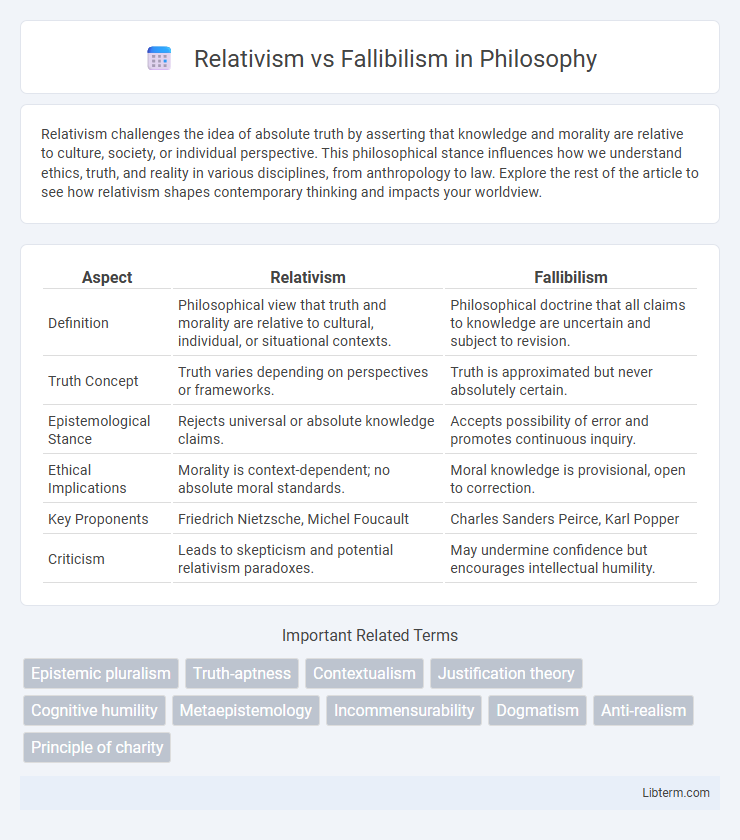Relativism challenges the idea of absolute truth by asserting that knowledge and morality are relative to culture, society, or individual perspective. This philosophical stance influences how we understand ethics, truth, and reality in various disciplines, from anthropology to law. Explore the rest of the article to see how relativism shapes contemporary thinking and impacts your worldview.
Table of Comparison
| Aspect | Relativism | Fallibilism |
|---|---|---|
| Definition | Philosophical view that truth and morality are relative to cultural, individual, or situational contexts. | Philosophical doctrine that all claims to knowledge are uncertain and subject to revision. |
| Truth Concept | Truth varies depending on perspectives or frameworks. | Truth is approximated but never absolutely certain. |
| Epistemological Stance | Rejects universal or absolute knowledge claims. | Accepts possibility of error and promotes continuous inquiry. |
| Ethical Implications | Morality is context-dependent; no absolute moral standards. | Moral knowledge is provisional, open to correction. |
| Key Proponents | Friedrich Nietzsche, Michel Foucault | Charles Sanders Peirce, Karl Popper |
| Criticism | Leads to skepticism and potential relativism paradoxes. | May undermine confidence but encourages intellectual humility. |
Introduction to Relativism and Fallibilism
Relativism asserts that knowledge and truth are not absolute but vary based on cultural, social, or individual perspectives, emphasizing the contextual nature of understanding. Fallibilism holds that human knowledge is inherently uncertain and subject to revision, acknowledging that no belief or theory can be proven with absolute certainty. Both philosophies challenge the notion of fixed, immutable truths by promoting a dynamic approach to knowledge evaluation and acceptance.
Defining Relativism: Core Principles
Relativism asserts that truth and moral values are not absolute but vary depending on cultural, social, or individual perspectives. Central principles include the rejection of universal standards, emphasizing that judgments are context-dependent and shaped by specific frameworks. This approach contrasts with objectivist views by prioritizing subjective experience and cultural diversity in defining truth.
Understanding Fallibilism: Essential Concepts
Fallibilism asserts that human knowledge is inherently imperfect and subject to revision based on new evidence or arguments, emphasizing continuous inquiry and openness to correction. Unlike relativism, which suggests that truth varies with different perspectives or cultures, fallibilism maintains that objective truth exists but our understanding of it is always provisional. Core to fallibilism is the commitment to critical thinking and the belief that certainty is unattainable, promoting intellectual humility and ongoing evaluation of beliefs.
Historical Origins and Philosophical Roots
Relativism traces its origins to ancient Greek sophists like Protagoras, who asserted that truth depends on individual perception, while fallibilism finds its roots in the philosophical skepticism of thinkers such as Socrates and later, Charles Sanders Peirce, who emphasized the provisional nature of knowledge. Relativism challenges the existence of absolute truths by highlighting cultural and contextual variability, whereas fallibilism acknowledges human cognitive limits but maintains that objective knowledge is attainable through continual inquiry and revision. These contrasting foundations shape ongoing debates about truth, epistemology, and the scope of human understanding in philosophy.
Key Differences Between Relativism and Fallibilism
Relativism asserts that truth and moral values are dependent on cultural, social, or individual perspectives, rejecting absolute standards. Fallibilism, on the other hand, acknowledges the possibility of error in human knowledge while maintaining that objective truth exists and can be progressively approached. The key difference lies in relativism's emphasis on context-dependent truths versus fallibilism's commitment to a provisional, yet objective, understanding of truth subject to revision.
Major Arguments For and Against Relativism
Relativism argues that truth and moral values are context-dependent, varying across cultures and individual perspectives, which promotes tolerance and acknowledges diverse viewpoints. Critics contend that relativism undermines objective standards, leading to logical inconsistencies and the inability to resolve conflicting claims. Major objections highlight that relativism's rejection of universal truths can result in ethical paralysis and challenges in establishing coherent knowledge frameworks.
Critical Perspectives on Fallibilism
Critical perspectives on fallibilism highlight its potential to undermine objective knowledge by overemphasizing the possibility of error in all beliefs, which may lead to excessive skepticism or paralysis in decision-making. Critics argue that while fallibilism accepts human cognitive limitations, it can blur the distinction between well-supported knowledge and mere conjecture, thereby weakening epistemic standards. This tension contrasts with relativism, which more explicitly questions the existence of absolute truths, whereas fallibilism maintains a commitment to provisional yet rational belief revision.
Relativism and Fallibilism in Epistemology
Relativism in epistemology argues that knowledge and truth are not absolute but depend on cultural, linguistic, or individual frameworks, challenging universal claims. Fallibilism asserts that human knowledge is inherently uncertain and subject to revision, emphasizing the possibility of error even in well-supported beliefs. Both perspectives highlight the limitations of epistemic certainty but differ in that relativism denies absolute truth while fallibilism maintains that objective knowledge is possible yet fallible.
Practical Implications in Ethics and Science
Relativism emphasizes that ethical and scientific truths vary based on cultural or individual perspectives, leading to challenges in establishing universal standards and fostering tolerance for diverse viewpoints. Fallibilism acknowledges the possibility of error in all knowledge claims, encouraging continual revision and improvement in ethical norms and scientific theories through critical inquiry and evidence-based reasoning. Practically, fallibilism promotes adaptive decision-making and progress, while relativism may support pluralism but risks moral and epistemic paralysis.
Concluding Thoughts: Bridging Relativism and Fallibilism
Relativism emphasizes the context-dependent nature of truth, while fallibilism underscores the inherent possibility of error in all knowledge claims. Bridging relativism and fallibilism involves acknowledging that knowledge is both provisional and situationally grounded, fostering open-minded inquiry. This synthesis promotes a nuanced epistemology that balances skepticism with the pursuit of reliable understanding.
Relativism Infographic

 libterm.com
libterm.com